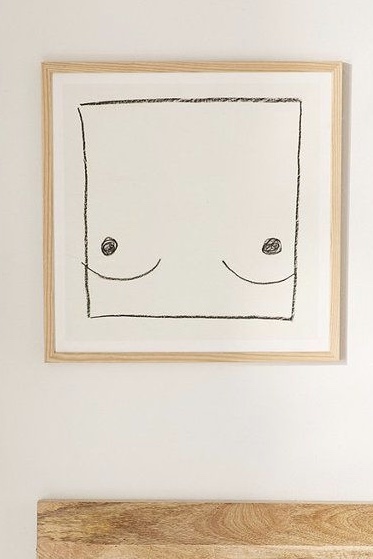“An embodied woman...has access to her appetite, her desire...a woman who can act, who can harness her creative energies, an alive and fertile mind, ready to give birth to many things. ”
Recently, I hung a piece of art in one of our therapy rooms that elicited strong reactions from our staff; feelings of embarrassment, discomfort, and mild disgust were expressed. One staff even admitted to turning the piece around when working in that room. What was the subject of such an evocative image? Breasts.
As a group of all-female therapists, I found these responses to be both curious and illuminating. It got me thinking about the internal dialogue we women are often having with our bodies, our sexuality, and the outside world. It strikes me that part of what is so dysregulating in viewing such a straight-forward image of breasts is the potency of desire it has the capacity to evoke, the immediacy of arousal and the direct awareness of the power we women carry just in our form. It feels dangerous.
Photo by Even Keel Imagery - Miriam Brummel
So what does all of this have to do with a woman’s creativity or the embrace of women as creators? It is my belief that the disavowal of our sexuality is, in part, a disavowal of our creative selves. Sexuality or eros is not simply about sex but about appetite; what we crave, what we desire. To me, a foundational element of creative energy; a basic requirement in troubling the rough and unknown terrain between imagination and manifestation. Audre Lorde describes this energy as, “a measure between the beginnings of our sense of self and the chaos of our strongest feelings.” To say it another way, eros is about vitality, life-force and the importance in learning to trust, shape, and share our self-knowledge and self-expression. Sensuality is about the embodiment of this energy; about an ability to inhabit and own oneself and utilize that energy in the process of creation. A powerful elixir. An embodied woman who has access to her appetite, her desire, is a woman who can act, who can harness her creative energies, an alive and fertile mind, ready to give birth to many things.
I return to image of the breasts but this time I imagine them as part of a whole, a full body of an alive and vital woman. A small act of rebellion to the discomfort and internalized patriarchy that has taught me to fear myself, to view my body and sexuality through the exclusive lens as an object of another’s desire. This woman I imagine has a subjectivity and a sexuality that is part of the whole, a sexuality that is deeply embedded in the story of woman.
So the picture remains. It hangs in testimony of the dialogue and tension we seek to hold as an all female staff. We are nurturers, comforters, and caretakers, we are also vitalized, embodied selves with the ability to dream, make, and do big things in this world.
HERE'S HOW YOU CAN PARTICIPATE IN DRESSEMBER WITH US:
Give! Visit our Dressember page and make a donation. It's that simple and no sum is too small. Truly.
Follow! Be sure to follow us on Instagram and our blog throughout the month of December. We will be documenting our fierce fashion choices but our deepest intention is to empower and educate.
Share! Help us spread the word. You can do this by sharing our social media posts or links to our Dressember fundraising campaign page.
Michelle Harwell, PsyD, LMFT is an expert trainer, respected speaker, and licensed therapist in trauma and attachment. She is noted for her specialization in areas of development, attachment, trauma, and neuroscience, and her ability to communicate complex topics with clarity and humor.













